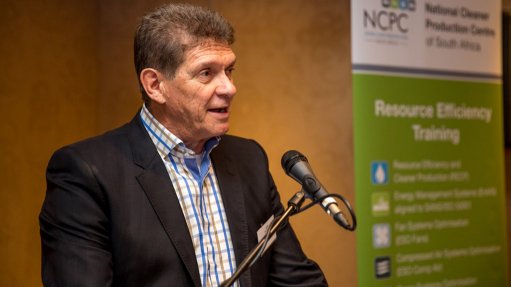
ALF HARTZENBURG Through training we have developed a cadre of energy management and energy systems optimisation experts across South Africa
The South African Industrial Energy Efficiency (IEE) project, led by local energy organisation the National Cleaner Production Centre South Africa (NCPC-SA), has won the International Energy Project of the Year.
The IEE project was one of 26 project applications, and the award was presented by the Global Association of Energy Engineers during a virtual award ceremony held last month.
NCPC-SA IEE national project manager Alf Hartzenburg states that the credibility gained through this award will “open new doors to companies that may have been reluctant to become involved in the project in the past and should facilitate the acceleration of our work in the industrial and commercial sectors”.
“The recognition of our work validates the application of our resources and expenses. This award confirms the project’s importance to government, and international and national stakeholders,” he enthuses.
Additionally, he notes that this award could promote the development of a financial mechanism for energy efficiency projects.
Hartzenburg says the benefits of the project have, ironically, been highlighted by the Covid-19 pandemic.
“The effect of Covid-19 on industrial competitiveness requires a focus on the efficacy of operations and business costs. Energy costs are generally one of the top five expenses in most businesses, and if you seek to remain sustainable and competitive, it demands improved management of energy and energy performance.”
The lockdown forced many industrial plants, factories and operations to discontinue operations, which, in turn, affected aspects of the services provided by the IEE project, Hartzenburg adds.
The lockdown did not stop the whole project, however, as the NCPC-SA was “forced to innovate” to continue implementing the project.
Such innovations included the NCPC-SA’s recruiting online, profiling plant energy consumption through its energy questionnaire, online training, virtual plant walk-throughs and scoping.
He also stresses that the pandemic has not resulted in the timeline of the IEE project being extended.
“We have been tracking well up until lockdown and will concentrate our effort over the remaining 13 months to tick all the boxes and achieve the outcomes by next year December. We have emerged from this lockdown more capable in operating remotely.”
Skills Development
Hartzenburg says the project has, through training initiatives, developed a “cadre of energy management and energy systems optimisation experts across South Africa”.
“The skills identified as vital for the project – from graduate engineers who understood the fundamentals to process technicians who were familiar with the troubleshooting of industrial systems – were improved through our training and the success demonstrated by our energy efficiency experts. Effective and sustainable change and performance improvement were achieved across all industrial sectors.”
Further, the IEE project has a strong focus on gender mainstreaming and promoting the participation of women in the energy sphere.
He highlights that gender mainstreaming has been “neglected in the face of competing business priorities”.
The focus of global body the United Nations Industrial Development Organisation has also placed a significant focus on gender mainstreaming and women in energy, says Hartzenburg.
He states that the NCPC-SA developed a gender mainstreaming baseline at the beginning of the second phase of the IEE project, which was based on the learning and achievements of the first phase. The centre kept note of the development of its gender mainstreaming performance in all of its offered technical services.
“We tracked the development of women in leadership roles in the industry, pioneered the importance of women in energy, and through fee concessions and promotions, encouraged them to participate in our training courses. We demonstrated our conviction of this through our project team, which comprises 67% women,” he concludes.